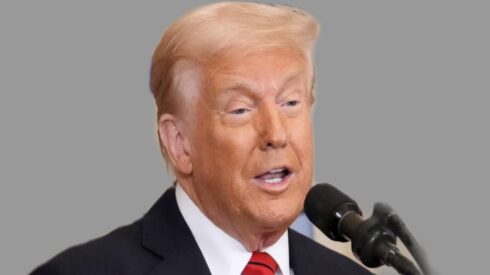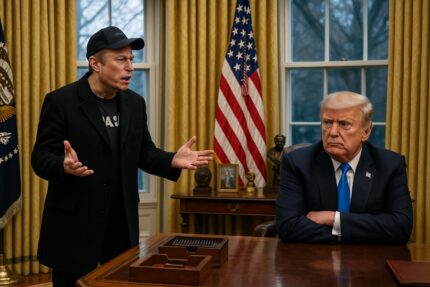In a significant development, U.S. President Donald Trump announced that the United States will engage in “direct talks” with Iran over its nuclear program this Saturday. The announcement came during a White House meeting with Israeli Prime Minister Benjamin Netanyahu, where Trump hinted at the high stakes involved in the discussion. “We have a very big meeting on Saturday [with Iran], and we’re dealing with them directly… And maybe a deal is going to be made, that would be great,” Trump said from the Oval Office.
Iran’s Foreign Minister Abbas Araqchi also confirmed the meeting, stating that although the talks would be “indirect,” they are both “an opportunity and a test.” The negotiations are set to take place in Oman, a neutral ground that has often hosted backchannel diplomacy between the two nations. Araqchi added on social media platform X: “The ball is in America’s court,” emphasizing that Iran’s openness is conditional on U.S. sincerity.
Trump’s Shift in Tone on Iran
Trump’s move marks a significant departure from his earlier stance. In 2018, during his first term, Trump unilaterally withdrew the U.S. from the landmark 2015 Joint Comprehensive Plan of Action (JCPOA), calling it “a terrible deal.” That agreement, forged under the Obama administration, required Iran to limit its nuclear program in exchange for sanctions relief. Since then, tensions have escalated, with Iran breaching several of the deal’s terms and enriching uranium beyond permitted levels.
Despite this history, Trump appears to be reconsidering diplomacy. He disclosed that his administration had previously reached out to Iran’s leadership through intermediaries from the United Arab Emirates. Although the initial offer was rejected, Iran later signaled a willingness to engage, albeit through indirect communication. This weekend’s talks mark the first confirmed direct negotiation attempt since the breakdown of the original nuclear accord.
A Warning and a Threat: High-Stakes Diplomacy
Trump emphasized the gravity of the upcoming talks, warning Iran of severe consequences if negotiations fail. “Iran cannot have a nuclear weapon, and if the talks aren’t successful, I actually think it’ll be a very bad day for Iran,” he declared. These remarks echo earlier threats made last month when Trump raised the possibility of military action after Iran’s Supreme Leader Ayatollah Ali Khamenei publicly rebuffed the idea of direct talks.
This hardline rhetoric reflects Trump’s characteristic negotiation strategy: a blend of public pressure and behind-the-scenes diplomacy. By labeling the meeting as “very high level,” he is signaling both the importance of the talks and the potential repercussions of failure. However, critics argue that such threats may undercut the chances of a diplomatic breakthrough.
Israel’s Strategic Concerns and Role in the Talks
Israel remains a central player in the Iran nuclear issue, and Prime Minister Netanyahu has made no secret of his skepticism about Iran’s intentions. Speaking alongside Trump, he reiterated Israel’s opposition to a nuclear-armed Iran, stating, “We and the United States are both united in the goal that Iran does not ever get nuclear weapons.”
Netanyahu also referenced Libya’s disarmament model as a possible framework for Iran, a comment likely to stir controversy in Tehran given the subsequent fate of Libyan leader Muammar Gaddafi. Israel has reportedly considered military strikes on Iranian nuclear facilities, and last year, it claimed to have targeted a nuclear site in response to an Iranian missile attack. Both leaders seem aligned in their determination to keep military options on the table should diplomacy fail.
The Road Ahead: Can Trust Be Rebuilt?
The upcoming talks come amid years of deteriorating relations and mutual mistrust. Iran’s uranium enrichment program has expanded rapidly, with the International Atomic Energy Agency (IAEA) warning that Tehran is accumulating materials that could potentially be used for nuclear weapons. Meanwhile, economic sanctions have left Iran’s economy strained, potentially motivating its leadership to consider diplomatic avenues.
Still, the path to a new agreement is fraught with political, strategic, and ideological hurdles. The JCPOA was co-signed by global powers including China, France, Germany, Russia, and the UK—any new deal would likely require some level of international coordination. For Trump, a successful negotiation could bolster his foreign policy legacy and reinforce his tough-on-Iran stance. For Iran, the challenge will be securing meaningful sanctions relief without appearing to capitulate under U.S. pressure.
With talks scheduled in Oman and the world watching closely, Saturday’s meeting may indeed be both an opportunity and a test—not just for U.S.-Iran relations, but for the broader geopolitical order in the Middle East.














